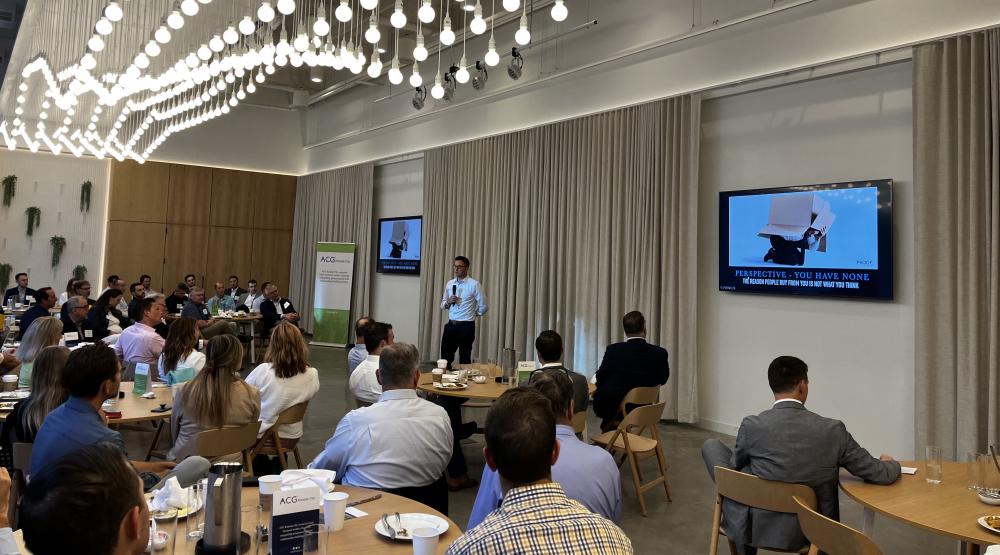
Join us at ACG DealMAX® from April 7-9 in Las Vegas. Register today!
August 25, 2023

Grant Gooding made himself into a customer expert by measuring millions of customers for clients in various industries.
Gooding is the founder and CEO of Overland Park-based Proof Positioning. He discovered after years of analyzing acquisition failures what the main cause was: a lack of understanding and measurement of why customers do business with organizations. The answer? It’s people and “emotional resonance” in their interactions.
He was the guest speaker at ACG’s Aug. 25 meeting. He titled his presentation “10 Things I Have Learned Measuring People for 10 Years.”
Gooding’s top 10:
No. 1: “People do business with people.”
Human to human interaction “is a genetic, fundamental imperative,” he said. “Do not forget it. Ask yourself: Are we doing business with people right now? Personas make us feel good. But they’re rarely accurate.”
You have about five different business personas at your company depending on your changing roles and audiences, Gooding said.
“Two of them are probably right,” he said. “It’s very easy to think of your customers as numbers or some characteristic that takes the humanity out of them. When you do that, your business will start failing. You lost the humanity,” and now your customers are going elsewhere.
No. 2: “Nobody cares about your awards.”
Listing your awards for your customers or prospective customers is “self-propagating language that makes us feel better,” but it’s mostly irrelevant to them. They want to know specifically how you will help them improve.
No. 3: “The reason people buy from you is not what you think.”
Gooding asked the audience to think of the top three reasons why their customers did business with them. Answers included “trust” and “they feel heard.” Proof Positioning asks CEOs what they think is the most important thing to their customers. The CEOs get it right 1 out of 23 times.
“It’s apparently challenging information to know,” he said. “We’re too close to it. We know our competitive advantage, so we think it’s that for the customer.”
No. 4: “If your customers are unhappy, it’s because you’re not talking to them.”
“Usually if you think customer satisfaction is a problem at your organization, you think it’s about a system problem and you rank it high,” he said. “But usually it’s lack of communication.”
He has a friend who runs a web company. The friend’s customers were unhappy. Proof Positioning studied the problem and found communication gaps. They created 56 automated messages to customers during the web-building process to check in with them on progress. They measured it a year later, and customer satisfaction improved.
When communicating with your customers, email is the most flexible and powerful medium, Gooding said.
No. 5: “People don’t care how it works.”
“You’re deductive” and analyze from the bottom up, he said. You think that if you could get people to understand how your process works, then they’d be more satisfied customers.
“But they don’t care,” he said. “They want to know how your service will make them better at the end.”
The more you talk about how your product and process work, “the more money you’re losing.”
No. 6: “Getting small things right gives you permission to get big sales.”
Proof Positioning did a study about six years ago for a niche distribution company that had created an innovative product. But the client couldn’t get customers to buy it and was baffled. A study revealed their customers’ perception that deliveries were late and inaccurate. But they weren’t.
Turns out a lot of other distributors also sent products to the company’s customers. Many of these distributors were late and inaccurate. Many customers lumped the company in with those distributors.
So, Proof Positioning recommended sending emails to customers updating accuracy and timeliness percentages. And their perceptions changed.
“You have to make sure on the ground floor that you’re doing simple stuff right such as deliveries and then more complex things,” he said.
No. 7: “Facts don’t equal reality.”
A large event venue was losing season ticket holders. Their exit data said they were too expensive. They asked Proof Positioning to study the problem.
“We said, ‘The facts you’re getting from people are little white lies,’” Gooding said. “Price is irrelevant. People were leaving mostly because of family things taking precedence. It’s the easiest thing to get somebody to go away.”
One solution: Ask the customer to make a deposit so when they’re ready to come back, you’ll give them a discount on their season tickets. Make predictions based on prior customer behavior. Having aggregated data doesn’t mean you understand your customer.”
No. 8: “Your customers are also using a competitor.”
Proof Positioning asks their customers whether they use other companies that do the same thing it does, and if so, who they are.
The “really good news” about customers also using your competitors is it shows the customers “really like what you do.”
“Competition can be a really good thing,” Gooding said. “It’ll keep you honest.”
No. 9: “Your generic marketing language is losing you money.”
What do the words trust, customer service and quality mean?
“They’re amalgamations of actual things that are meaningful,” he said.
These words and phrases are vague. Make them specific instead.
“What if you say, ‘We give you the cell phone of every rep so you can call them anytime 24-7’? That’s a real thing. It’s tangible, it’s meaningful and someone knows what to do with it. Saying that you give good customer service is literally losing you money.”
Quality is difficult if not impossible to define. But default rate per million is concrete and useful. The density of a product material is real, and someone knows what it means. If you order a thousand of these, how many will be defective? One in a thousand is one of the lowest rates in the industry.
No. 10: “Using only one message won’t cut it.”
“Standing for one thing—that’s good,” he said. “You should stand for one thing if you can pull it off.”
People are different from one another, though, even if they have the same titles and responsibilities.
“When you go into a job, you take on a persona because your responsibilities change,” Gooding said.
The better you understand your customers’ different roles and the messages you should use with those roles, the better your success. This improves your bottom line.

ACG's DealMAX® is the middle market's can’t-miss M&A event. Join 3,000+ dealmakers on April 7-9 for one-on-one meetings, networking, industry insights, fun and more.
